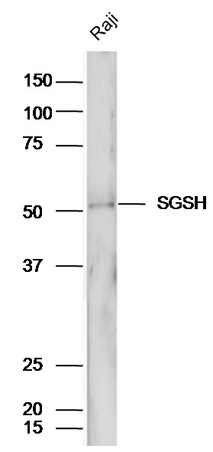SGSH Antibody
Purified Rabbit Polyclonal Antibody (Pab)
- SPECIFICATION
- CITATIONS
- PROTOCOLS
- BACKGROUND

Application
| WB, IHC-P, IHC-F, IF, ICC, E |
|---|---|
| Primary Accession | P51688 |
| Reactivity | Human, Mouse, Rat, Dog |
| Host | Rabbit |
| Clonality | Polyclonal |
| Calculated MW | 55 KDa |
| Physical State | Liquid |
| Immunogen | KLH conjugated synthetic peptide derived from human Sulphamidase |
| Epitope Specificity | 301-388/502 |
| Isotype | IgG |
| Purity | affinity purified by Protein A |
| Buffer | 0.01M TBS (pH7.4) with 1% BSA, 0.02% Proclin300 and 50% Glycerol. |
| SUBCELLULAR LOCATION | Lysosome. |
| SIMILARITY | Belongs to the sulfatase family. |
| Post-translational modifications | The conversion to 3-oxoalanine (also known as C-formylglycine, FGly), of a serine or cysteine residue in prokaryotes and of a cysteine residue in eukaryotes, is critical for catalytic activity. |
| DISEASE | Defects in SGSH are the cause of mucopolysaccharidosis type 3A (MPS3A) [MIM:252900]; also known as Sanfilippo syndrome A. MPS3A is a severe form of mucopolysaccharidosis type 3, an autosomal recessive lysosomal storage disease due to impaired degradation of heparan sulfate. MPS3 is characterized by severe central nervous system degeneration, but only mild somatic disease. Onset of clinical features usually occurs between 2 and 6 years; severe neurologic degeneration occurs in most patients between 6 and 10 years of age, and death occurs typically during the second or third decade of life. MPS3A is characterized by earlier onset, rapid progression of symptoms and shorter survival. |
| Important Note | This product as supplied is intended for research use only, not for use in human, therapeutic or diagnostic applications. |
| Background Descriptions | Sulfatases are enzymes that hydrolyse a diverse range of sulfate esters. Deficiency of lysosomal sulfatases leads to human diseases characterized by the accumulation of either GAGs (glycosaminoglycans) or sulfolipids. Sulfamidase, also known as HSS, SFMD, MPS3A or SGSH, is a 502 amino acid lysosome that belongs to the sulfatase family. It has been suggested that sulfamidase may be involved in the lysosomal degradation of heparan sulfate. Defects in the gene encoding sulfamidase are the cause of Sanfilippo syndrome A, an autosomal recessive lysosomal storage disease caused by impaired degradation of heparan sulfate. Sanfilippo syndrome A is characterized by severe central nervous system degeneration but relatively mild somatic manifestations. |
| Antigen Region | 301-388/502 aa |
| Gene ID | 6448 |
|---|---|
| Other Names | N-sulphoglucosamine sulphohydrolase, Sulfoglucosamine sulfamidase, Sulphamidase, SGSH, HSS |
| Dilution | WB=1:500-2000,IHC-P=1:100-500,IHC-F=1:100-500,ICC=1:100-500,IF=1:100-500,ELISA=1:5000-10000 |
| Format | 0.01M TBS(pH7.4), 0.09% (W/V) sodium azide and 50% Glyce |
| Storage | Store at -20 ℃ for one year. Avoid repeated freeze/thaw cycles. When reconstituted in sterile pH 7.4 0.01M PBS or diluent of antibody the antibody is stable for at least two weeks at 2-4 ℃. |
| Name | SGSH |
|---|---|
| Synonyms | HSS |
| Function | Catalyzes a step in lysosomal heparan sulfate degradation. |
| Cellular Location | Lysosome. |

Thousands of laboratories across the world have published research that depended on the performance of antibodies from Abcepta to advance their research. Check out links to articles that cite our products in major peer-reviewed journals, organized by research category.
info@abcepta.com, and receive a free "I Love Antibodies" mug.
Provided below are standard protocols that you may find useful for product applications.
References
Scott H.S.,et al.Nat. Genet. 11:465-467(1995).
Karageorgos L.E.,et al.Submitted (NOV-1996) to the EMBL/GenBank/DDBJ databases.
Ota T.,et al.Nat. Genet. 36:40-45(2004).
Zhang H.,et al.Nat. Biotechnol. 21:660-666(2003).
Chen R.,et al.J. Proteome Res. 8:651-661(2009).
If you have used an Abcepta product and would like to share how it has performed, please click on the "Submit Review" button and provide the requested information. Our staff will examine and post your review and contact you if needed.
If you have any additional inquiries please email technical services at tech@abcepta.com.













 Foundational characteristics of cancer include proliferation, angiogenesis, migration, evasion of apoptosis, and cellular immortality. Find key markers for these cellular processes and antibodies to detect them.
Foundational characteristics of cancer include proliferation, angiogenesis, migration, evasion of apoptosis, and cellular immortality. Find key markers for these cellular processes and antibodies to detect them. The SUMOplot™ Analysis Program predicts and scores sumoylation sites in your protein. SUMOylation is a post-translational modification involved in various cellular processes, such as nuclear-cytosolic transport, transcriptional regulation, apoptosis, protein stability, response to stress, and progression through the cell cycle.
The SUMOplot™ Analysis Program predicts and scores sumoylation sites in your protein. SUMOylation is a post-translational modification involved in various cellular processes, such as nuclear-cytosolic transport, transcriptional regulation, apoptosis, protein stability, response to stress, and progression through the cell cycle. The Autophagy Receptor Motif Plotter predicts and scores autophagy receptor binding sites in your protein. Identifying proteins connected to this pathway is critical to understanding the role of autophagy in physiological as well as pathological processes such as development, differentiation, neurodegenerative diseases, stress, infection, and cancer.
The Autophagy Receptor Motif Plotter predicts and scores autophagy receptor binding sites in your protein. Identifying proteins connected to this pathway is critical to understanding the role of autophagy in physiological as well as pathological processes such as development, differentiation, neurodegenerative diseases, stress, infection, and cancer.


